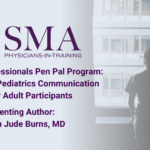Abstract | May 5, 2021
The Young Professionals Pen Pal Program: An Exercise in Pediatrics Communication Skills for Adult Participants
Learning Objectives
- Describe improvement in communication skills and understanding of the social determinants of health following participation in the Young Professionals Pen Pal Program;
- Report methods of evaluation of community program success;
- Consider bidirectional learning in programming connecting adults and children.
Introduction:
As the Hispanic population booms across the United States, Latino students are becoming more represented in science, technology, engineering and mathematics (STEM) disciplines. Simultaneously, many medical students report deficits in their comfort communicating with pediatric patients in their early clinical training. The Young Professionals Pen Pal Program (YP4) was developed out of both the need for mentorship and English language practice for students in the Supplemental Education for English Language Learners Program at Seminole Springs Elementary School and improved pediatric communication skills for students completing health professions training. Through YP4, elementary school students in Eustis, FL communicate on a monthly basis with health professions students.
Methods:
The program was first implemented during the 2018-2019 academic year, and included 8 students in the health professions. To evaluate YP4, the health professions students were administered an anonymous survey composed of free responses and Likert scales to evaluate their perceptions of the program and its educational outcomes. These responses were considered a data set subjected to a quantitative and qualitative analysis.
Results:
Among adult participants, 87.5% “Strongly Agree” with the statements, “I enjoyed participating in YP4”, “I would participate in YP4 again if the opportunity arises”, “The time commitment for YP4 was appropriate”, and “YP4 offered an extracurricular opportunity to improve communication skills with children”. When reviewing free responses, themes emerged including improved age appropriate vocabulary, identifying YP4 as a valuable opportunity to connect children with professionals of a similar background, offering mentorship and improved confidence.
Discussion:
These results support that the program objectives of improving the communication skills of health professions trainees by participation in YP4 were achieved. These responses also indicate an improved understanding of the social determinants of health, including more open communication as the relationships developed with increased understanding of the impact of living conditions, access to resources, family dynamics and language on access to healthcare. Further, the elementary school students gained valuable mentors in their pursuits of higher education, particularly in STEM disciplines. In striving toward both social justice and educational equity, YP4 represents proactive programming on the part of Seminole Springs Elementary School and the Herbert Wertheim College of Medicine to better serve their communities and their changing demographics.

